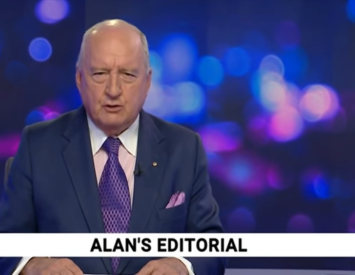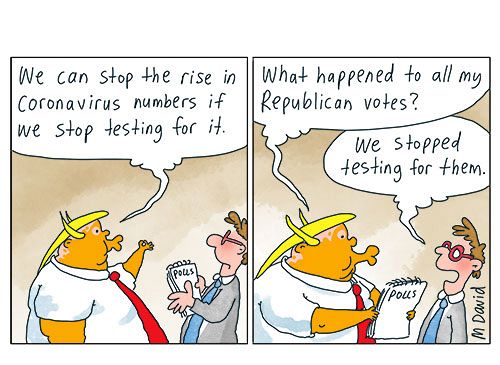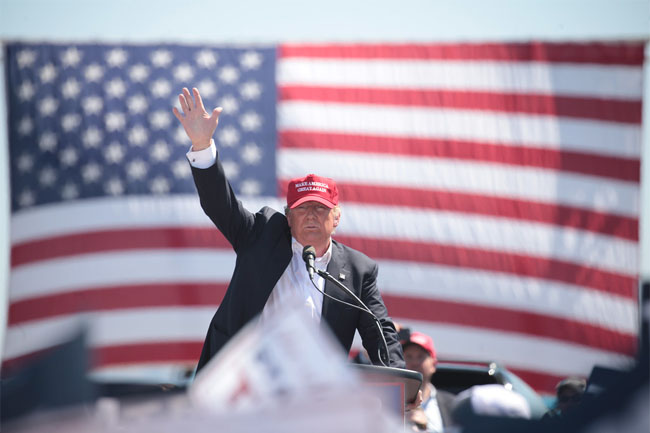The launch of Sky News Regional this month further solidifies Rupert Murdoch's already tight grip on Australia’s right-wing media landscape.
The channel’s new broadcast partners WIN and Southern Cross Austereo offer Sky up to seven million new viewers across regional Australia.
Soon, our country cousins will be able to settle in each evening with the soothing company of Peta Credlin, Andrew Bolt and Alan Jones.
Although regional viewership is currently small, Sky News’ national audience has grown dramatically in the last year and there is little to suggest that this success won’t be replicated in the bush. We’ve seen this model elsewhere, and the consequences are worth considering.
From its launch in 1996, America’s Fox News now holds a 19-year streak as the nation’s top cable news network. Just as with Sky in Australia, Fox has a split personality, with right-leaning daytime news coverage followed by primetime toxicity, in the form of bile-spewing hosts like Sean Hannity, Laura Ingraham and Tucker Carlson.
Fox’s stunning success has allowed Murdoch to assume the role of kingmaker, as his 24-hour ratings machine is used to amplify issues and offer exposure to needy politicians, or to pour scorn on the unworthy. Fox now plays a central role in American conservative public life, and nowhere has that been more clearly demonstrated than in the presidency of Donald Trump.
Trump, an avid media consumer, was known for simultaneously absorbing and reflecting Fox’s talking points. Fox afforded Trump an echo chamber where his endless lies went unchallenged and were often amplified by compliant hosts.
As President, Donald Trump appeared on Fox News around eight times more often than any other U.S. TV network. Fox has given Republicans a safe place to go, a media home where follow-up questions never come, and where the channel both sets and reflects the day’s political agenda.
Fox’s uncritical eye allowed Trump-era news agendas to become circular. Hosts voice an opinion, Trump says he’d heard something on Fox and the channel, in turn, reporting the President’s remarks as news.
The line between journalist and politician hasn’t so much been blurred as obliterated. Sean Hannity often travelled with the President, was introduced by Trump on stage and was said to speak to Trump almost every night before his show started.
The astonishing reach of Fox’s message combined with the complete breakdown of a traditional journalistic detachment has led many to label today’s Fox News as a propaganda operation rather than a news channel. There have been calls for Fox to be forced to drop the word "News" from its title altogether.
Worse, serious students of American history now suggest that Fox is a primary cause of the crisis of political mistrust and division that today threatens the very fabric of America’s democracy.
So how does that apply to Australia? Is the "Fox effect" already in evidence and what lessons can we learn from America’s experience?
Perhaps the key takeaway from Fox News is that unregulated, propaganda-esque bile delivered in a news format can be spectacularly successful and that this success in dividing and misinforming people can be weaponised by those with political power.
There is already considerable evidence that the hard right is on the march in Australia, both socially and at a political level, and much of it resembles or even replicates America’s recent history. Men wearing Proud Boys t-shirts held rallies on Australia Day this year and extremist groups have made their presence felt in Victoria’s Grampians region.
ASIO has made it clear that violent right-wing ideology remains a national security concern.
Political figures such as Craig Kelly and George Christensen reflect their American cousins by voicing obvious and often absurd falsehoods while personifying the moral contradictions often central to far-right, white male blowhards.
Let’s not forget that Prime Minister Scott Morrison, who has consistently downplayed and dismissed the rise of white supremacy and extremism in Australia, is also good friends with one of this country’s most prominent Q-Anon conspiracy theorists.
There are already plenty sounding the alarm, not least Kevin Rudd, who has called for a Royal Commission into media ownership and points out that regional Australia is ‘increasingly news starved [with] the disappearance of news print’, a disappearance that is in significant part due to commercial decisions taken by Rupert Murdoch’s other company, News Corp.
Almost simultaneous to Sky News Regional launch, YouTube banned Sky News Australia from uploading content to its site for seven days, apparently in response to videos in which Sky hosts downplayed COVID-19 dangers or promoted the use of unproven medications like hydroxychloroquine.
Sky’s YouTube channel, which has 1.85 million subscribers, clearly got the message and removed several offending videos, but there’s little to suggest this reflects a broader change of direction.
Sky and Murdoch are not solely to blame. Social media sites, and Facebook in particular, hold deep responsibility for failing to shut down extremists, and allowing algorithms to reinforce misinformation and hard-right messaging.
But America’s experience is clear: Rupert Murdoch’s Fox News is one of the primary causes of the sort of social and political division that in great part explains the rise of Donald Trump and ultimately led to the 6 January insurrection that came within a whisker of democratic catastrophe.
Rupert Murdoch is an American. He already holds more consolidated media power in Australia than in any other developed democracy on earth. Foxtel has 3.5 million subscribers. News Corp controls 65 per cent of the nation’s daily newspapers. It’s clear from Fox News example that Murdoch’s model of hysterical ultra-right media bile is a money-spinner.
Yet the cost to society is often substantial.
Australia’s flawed electoral system means that the National party hold a dramatically oversized influence on government, relative to their share of the vote.
From Murdoch’s perspective, gaining influence over regional Australian minds offers an incredible political return on investment. Those who care about Australia’s democracy should stand up to the continued rise of far-right media before it is too late.
If the media regulator won’t do it, then only a change in government will.
And guess what side Sky News will be taking when the election is called?
George Grundy is an English-Australian author, media professional and businessman. Read more from George on his blog americanprimerweekly.com or follow him on Twitter @georgewgrundy.
Related Articles
- The Coalition, the Labor Party and the media
- The Murdoch propaganda machine needs to be stopped
- How Morrison's media bargaining code sold Australia's soul to wretched Rupert and Mark Zuckerberg
- Despite ‘irresponsible journalism of the worst kind’, Murdoch gets a gong
- The effect of Right-wing bias in Australia's media
 This work is licensed under a Creative Commons Attribution-NonCommercial-NoDerivs 3.0 Australia License
This work is licensed under a Creative Commons Attribution-NonCommercial-NoDerivs 3.0 Australia License
Support independent journalism Subscribe to IA.















